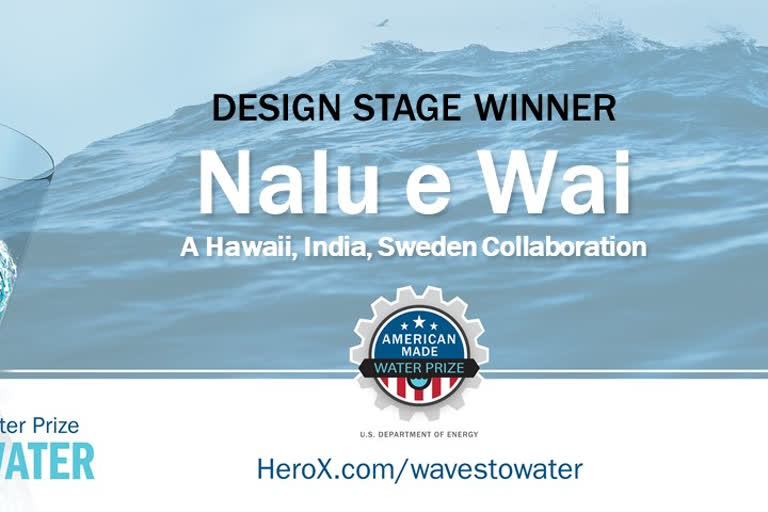Chennai: Indian Institute of Technology Madras researchers are part of an international team that won the first two phases of the ‘Waves to Water Prize’, a competition organized by the US Department of Energy.
The objective is to design a wave energy-based desalination system to provide post-disaster drinking water supply to coastal areas. Team ‘Nalu e Wai’ is a collaboration between the US, India and Sweden. Team ‘Nalu e Wai’ (Hawaiian for ‘waves into fresh water’) is working on a rapidly-deployable, small-scale wave-powered desalination system. Deployment of substantial numbers of these devices in such water-scarce regions could produce life-changing results for water-starved coastal communities.
The U.S. Department of Energy, Waterpower Technologies Office, organizes the ‘Waves to Water’ Prize to challenge innovators to submit ideas to develop wave-powered desalination systems. The collaborating universities in team ‘Nalu e Wai’ are IIT Madras, University of Hawaii in Honolulu, US and Uppsala University, Sweden. Team ‘Nalu e Wai’ was among 17 winners, out of more than 100 global teams, in Rounds I and II. They were awarded monetary prizes for the selections.
Elaborating on the research being undertaken by Team ‘Nalu e Wai,’ Prof. Abdus Samad, Department of Ocean Engineering, IIT Madras, said, “Our team’s primary driver for this submission was the water shortage in India and to supplement our knowledge in the area of wave energy conversion. We felt strongly that we could devise a system that would achieve the prize-motivated benefits of applicability to disaster-stricken areas and remote communities, while also being scalable to larger community applications such as Chennai, or in developed countries with water shortages, such as coastal California.”
Read: IIT Madras develops, boots up MOUSHIK microprocessor for IoTs
Further Prof. Abdus Samad said, “The idea is new for portable small-scale wave-powered desalination devices. Our concept is entirely scalable. Its modularity allows it to be adapted to varying deployment sites and wave regimes. The same concept could easily be scaled to support much larger water production with increasing flap size and by deploying devices in numbers. Larger RO units, adding additional RO units in parallel, together with larger flap geometry, can easily result in much greater freshwater production. This application is of particular interest to the places like Chennai, where water scarcity is fast reaching critical levels.”
The Waves to Water Prize is a five-stage, $ 3.3 million contest to accelerate the development of small, modular, wave-powered desalination systems capable of providing potable drinking water in disaster relief scenarios and remote coastal locations. This prize is part of the U.S. Department of Energy’s ‘Water Security Grand Challenge,’ focused on advancing transformational technology and innovation to meet the global need for secure and affordable water.
Highlighting the technology that Team ‘Nalu e Wai’ is working on, Prof. Abhijit Chaudhuri, Department of Applied Mechanics, IIT Madras, said, “Desalination has become imperative in order to solve the problem of global freshwater scarcity, particularly for the coastal areas. However, currently available desalination technologies need large amounts of thermal energy or high-quality electricity for seawater purification, which is highly expensive and energy-intensive. Hence, the utilization of renewable energies such as solar, wind, tidal and wave energy for freshwater supplies appears to be fundamentally attractive and has been recognized as a potential and sustainable alternative with minimum environmental impact. As one of the most concentrated forms of renewable energy, wave energy offers an environmentally friendly alternative and is highly favourable for seawater desalination in coastal areas with good wave resources.”
Climate change appears to be worsening the global water crisis. Team ‘Nalu e Wai’ felt they could contribute in a near-term and meaningful way with solutions coming out of the Waves to Water competition. Another motivation comes from the team’s desire to work together on a concept and foster new collaborations in the future.
Speaking on the experience of working on an international collaborative research project, Dr. Patrick Cross, Program Manager for Marine Energy, Hawaii Natural Energy Institute, University of Hawaii, who is overseeing research and logistics support to the U.S. Navy’s Wave Energy Test Site (WETS), said, “Coordinating a research collaboration across three continents is challenging, due to large time differences, but our team has utilized video conferencing tools online to great effect to continue to press our concept toward maturity. Working with our colleagues at IIT Madras has been inspiring and rewarding, and we look forward to continuing in the competition, with the target of reaching the final ‘Drink Stage’ and competing with other teams in the real ocean along the east coast of the United States. Drs. Samad and Chaudhuri have put together an outstanding group at IIT that complements our other team members in Hawaii and Sweden perfectly. I have high confidence in this team, and I believe we have a concept that can ultimately make an important societal impact – in India, and around the world.”
Dr. Krishnakumar Rajagopalan, a senior researcher at the University of Hawaii, said, “Our design is coming from the fundamental understanding of ocean engineering, mechanical systems design, desalination systems and environmental engineering. The whole gamut of works is being done by experts in different fields. We hope we will provide something priceless to society.”
Also read: IIT Madras Faculty Develop AI Models to Process Text in 11 Indian Regional Languages



